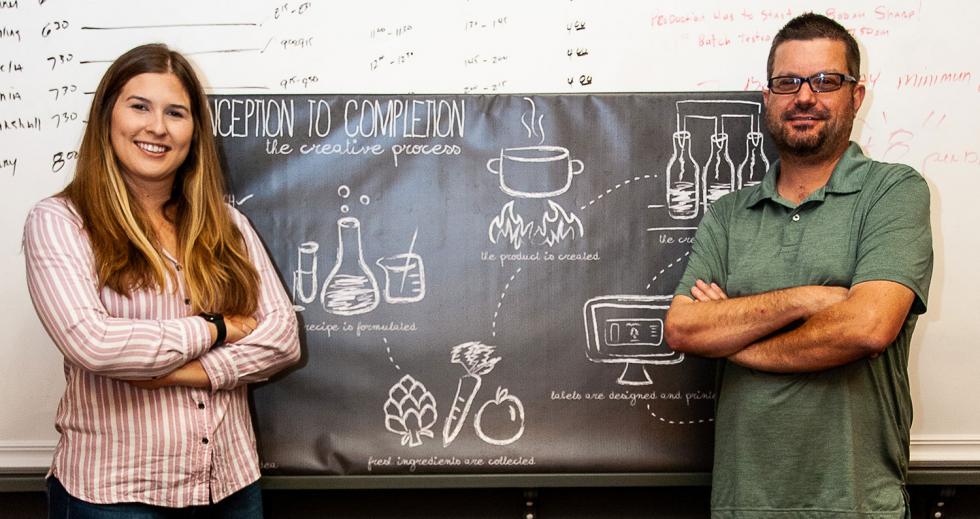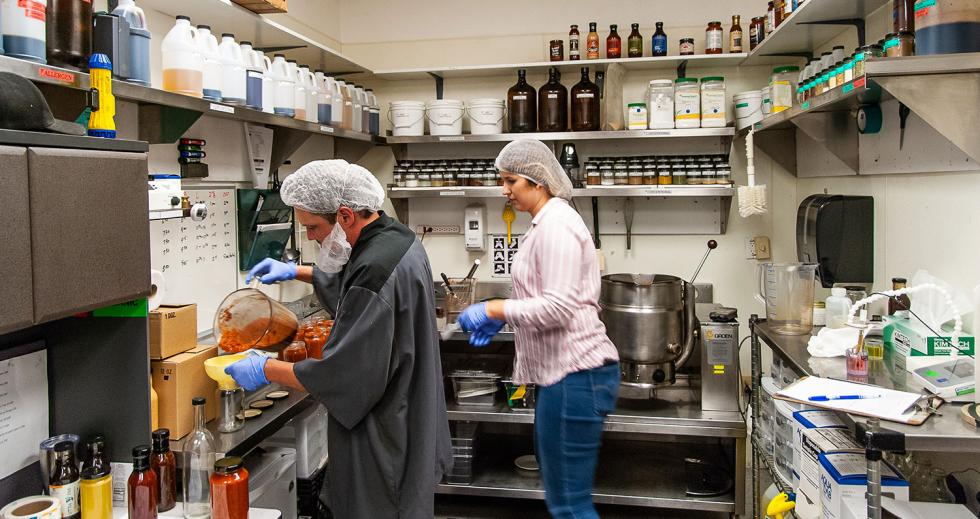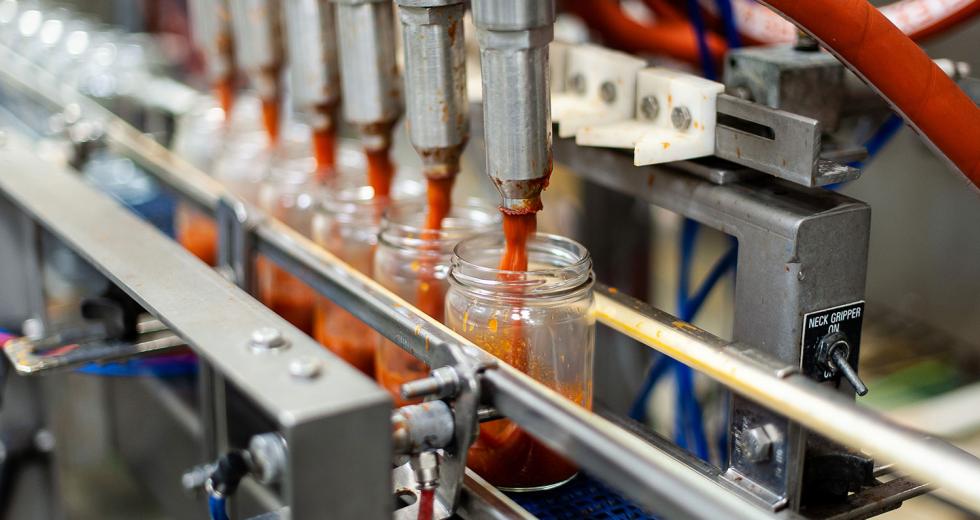Amid the clatter of machinery and the beeping of forklifts, workers wearing white hair nets tend their stations around the assembly line in the warehouse-like production kitchen of Mad Will’s Food Company on the outskirts of Auburn.
Steam rises from 150-gallon kettles as metal blades churn batches of fragrant apricot-ginger-teriyaki glaze, which is soon pumped through stainless-steel pipes into a holding tank. From there, it’s injected into bottles that move on a conveyor belt to the capping and labeling stations. The bottles are quickly handpacked a dozen to a box for shipment to a farmstand in Georgia, one of hundreds of Mad Will’s customers around the United States.
Now it’s time to clean the equipment and cook the ingredients for the next run, a batch of barbecue sauce destined for the gift store at legendary Harris Ranch Inn & Restaurant in Coalinga.
“We can make up to 30,000 pounds of [product] a week at peak production,” says Tuck Caruthers, Mad Will’s director of operations, raising his voice over the racket. “More than 80 percent of the produce we use is grown in California.”
In the world of food production, Mad Will’s is what’s known as a contract manufacturer. The company specializes in housemade-quality condiments — sauces, vinaigrettes, mustards, marinades, fruit toppings and the like — that it cooks, bottles and labels onsite. Its customers are food entrepreneurs who want to distribute and sell their own house-branded products, and they turn to Mad Will’s for the know-how.
Each individual product — say, pasta sauce — is called a “sku,” and Mad Will’s clients typically have multiple skus, or lines. The products are distributed nationwide by Mad Will’s customers — under their own labels — to a broad range of boutique and corporate supermarkets, specialty markets, farm stands, restaurants, wineries and more.
From left: Director of Quality Assurance and Product Development
Brandi Kaspar and Director of Operations Tuck Caruthers have
worked closely with new owner Scott Bartosh (not pictured) to
revive Mad Will’s.

The 20,000-square-foot Mad Will’s complex has been through highs and lows since opening in 1989 solely to make the sauces for the Firehouse Bar-B-Que restaurant chain in the Bay Area, says Mad Will’s founder, William Russell-Shapiro. When the chain went national, Mad Will’s was shipping truckloads of sauce.
But production stopped when the Firehouse brand was sold in 1996 and the East Coast buyers chose to make their own sauce. “After that, we branched out locally and our business grew,” Caruthers says. One longtime client was Bay Area barbecue giant Kinder’s, another was the Raley’s supermarket chain.
Everything changed when Russell-Shapiro sold Mad Will’s in 2015 to new owners, who rebranded it Purveyor’s Kitchen. That incarnation spiraled into bankruptcy by early 2018. Russell-Shapiro went on to found the Absinthe Group of restaurants and bars in San Francisco.
But veteran production manager Scott Bartosh put up $200,000 to buy Purveyor’s Kitchen out of bankruptcy, reinstating the original Mad Will’s name and reopening in September 2018. Bartosh is president and sole owner, working closely with Caruthers and Director of Quality Assurance and Product Development Brandi Kaspar. Bartosh brought in consultant Tim Yamauchi, former CFO of Pride Industries, to help reanimate the company, and retained 10 longtime employees for a staff total of 14.
From left, Terry Downey and Brandi Kaspar work in the Mad Will’s
testing and development room.

Mad Will’s is unique in that “we don’t have a direct competitor [in our area] that does what we do,” Caruthers says. The nearest co-packer is CMS Fine Foods in Healdsburg. Mad Will’s is unusual as it runs on two models — private-label branding and co-packing.
“Private label” means a company — say, a boutique market — comes to Mad Will’s and pays to have a multi-product line bottled and labeled with its own brand, but made from Mad Will’s recipes. “It’s our product with your label,” as Caruthers puts it. Private-labeling costs $350 to $500 for a minimum order of 10 cases, depending on the product. For instance, chocolate sauce costs more to make than barbecue sauce.
Mad Will’s makes more than 100 products for its 200-plus private-label customers, which include Oto’s Market in Sacramento, Mollie Stone’s Markets and Lunardi’s Markets in the Bay Area, and Cal Mart in Calistoga.
“We [recently] created four new private-label products, with more under development,” says Kaspar, who holds a degree in food science and technology from UC Davis. Also, she and her team are making “clean” ingredients for some of the older private-label recipes, verifying they’re Whole Foods compliant (free of certain chemicals).
The second Mad Will’s model, co-packing, is when a food entrepreneur has a proprietary recipe and wants to market it. “It’s their product and their label,” Caruthers says. “They bring us the recipe, we help them formulate it and put it into production.” Bartosh says the company has more than 50 regular co-packer partners and is averaging two new ones a week.
“We’re repositioning our strategy, expanding, modernizing and working more closely with food entrepreneurs to build on what the original Mad Will’s always did.” Tim Yamauchi, consultant, Mad Will’s Food Company
The initial cost to co-pack — from first analysis to finished product — is $7,500 for 100 cases. “We don’t want someone to come here with their nest egg and have no idea what the market is like, so we’re educating them and making sure they’re ready to go,” Caruthers says. Mad Will’s also advocates for its customers, working with brokers to get their products into stores.
One Mad Will’s co-packing partner is Michael Loubier, founder of Loubier Gourmet in Benicia. The former restaurateur walked in with two proprietary BBQ sauces that soon were in stores and on his website, along with a line of five seasonings. Loubier has since formulated nine more sauce skus. In Sacramento, his products are in Corti Bros., Taylor’s and Compton’s markets.
A newcomer to Mad Will’s is co-packer B&R Farms in Hollister. Owners Mari and Jim Rossi own an heirloom apricot orchard from which they source five skus from family recipes. “We want to add a few new products to our line before the holidays,” Mari Rossi says. B&R products are in Raley’s and Bel Air markets.
One niche market Mad Will’s is developing is private labeling for corporate entities. It already has a relationship with the San Jose Giants minor-league baseball team with a barbecue sauce and is approaching craft breweries.
“Food trends are changing to local, fresh and sustainable, and we’re right there with that,” Yamauchi says. “The timing couldn’t be better.”



